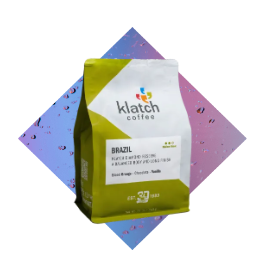
About this Coffee
Mike Perry sourced this coffee from one of his trips and it is a hand-selected blend from three farms located in Cerrado Mineiro region. It starts with a semi-sweet chocolate and bright orange aroma. The cup brings out flavors of blood orange with a semi-sweet chocolate and a vanilla finish.
Offering a balanced body and long finish. You are sure to enjoy this cup of Natural Processed Coffee. Mike cups coffee from over 120 different farms to find the perfect beans from Brazil.
This year he doubled his pleasure by blending beans from two farms:
Santo Antônio-Santa Rita
Farmer Adalberto Zanon dos Santos and Fazenda Riacho das Varas, Farmer Ricardo Hirofumi Yoshimatsu both produce Yellow Catuai:
These farms are located in Matas de Minas coffee region is in the southeastern part of the Minas Gerais state, just over the border from Espirito Santo, with Alto Caparaó as its most recognized of the 63 municipalities that compose the region. With a distinct topography featuring rugged mountain terrains, a mild Brazilian Atlantic Forest climate, and large variations in elevation (between 600 and 1450 meters above sea level), Matas de Minas makes a perfect region for growing specialty coffees.
These lots of Yellow Catuai coffee underwent Natural processing. Catuai was developed by the Instituto Agronomico (IAC) of Sao Paulo State in Campinas, Brazil by crossing Mundo Novo and Caturra varieties.
Paiolinho, Chapadão de Ferro lugar Santa Rita
Farmer Edenilson Jose Fornaro and Ernesto Fornaro:
This farm is located in the Cerrado Mineiro region, northwest of Minas Gerais State. Natural process Red Catuai lot was developed by the Instituto Agronomico (IAC) of Sao Paulo State in Campinas, Brazil by crossing Mundo Novo and Caturra varieties.The dry climate during harvest eliminates potential problems with humidity during the drying process. Minas Gerais is Brazil’s principal agricultural state, and the Cerrado is home to many of the country’s celebrated coffee estates, with expertise in planting, harvesting, drying, and sorting. We love Cerrado coffees for their big body, rich chocolate notes, and velvety texture when pulled as espresso.
The Matas de Minas coffee region is in the southeastern part of the Minas Gerais state, with a distinct topography featuring rugged mountain terrains, a mild Brazilian Atlantic Forest climate and the Cerrado Mineiro region, located in northwest of Minas Gerais State is a world-recognized, high-quality coffee producing origin and became the first Protected Geographical Indication in Brazil in 2005, with full Designation of Origin in 2013. A strong characteristic of this region is its well-defined seasons—a hot, wet summer followed by a pleasantly dry winter. The dry climate during harvest eliminates potential problems with humidity during the drying process. Minas Gerais is Brazil’s principal agricultural state, and the Cerrado is home to many of the country’s celebrated coffee estates, with expertise in planting, harvesting, drying, and sorting. We love Cerrado coffees for their big body, rich chocolate notes, and velvety texture when pulled as espresso.
Today, the area’s 4,500 farmers produce a combined average of 6 million bags per harvest, with an average of 35 bags per hectare. To reach these production levels, producers had to first adapt to the region’s conditions. Coffee farmers first arrived in Cerrado in the 1970’s, after being pushed out of the state of Parana by frost and out of the state of Sao Paolo by nematodes. They found the soil in Cerrado to be very acidic, which they rectified with the application of calcium to create the healthy soils they enjoy today. Cerrado coffee farms are cultivated in areas with elevations varying between 800 and 1,300 meters above sea level and are known for consistently producing high quality coffees with a repeatable profile. Independent of farm size, the spirit of professionalism is present throughout Cerrado’s coffee producers. Entrepreneurialism is part of farmers’ DNA, and many producers are second or third generation growers who also hold degrees in agronomic engineering, business management, and administration. While each family narrative is different, Cerrado is characterized by an enterprising attitude.